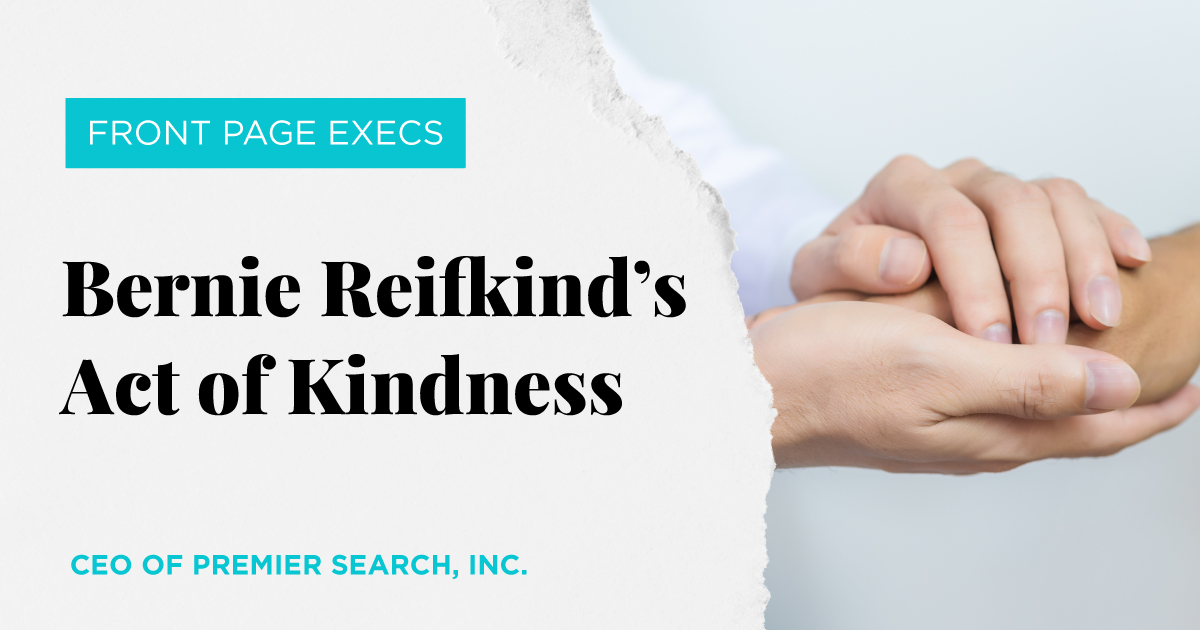Employees are the most critical resource for any business, so by extension, employee retention is crucial in maintaining a productive and successful work environment. In one survey, 58% of employees say they have left or would leave a job with a negative workplace culture. There is a growing focus for companies in terms of building employee trust and loyalty, which is a topic Bernie Reifkind frequently posts about on his LinkedIn profile.
An Act of Kindness
Reifkind is the CEO of Premier Search, a hiring firm that works with healthcare companies to solve their staffing needs. The hiring process and finding the right person for the right role are all job-related aspects that Reifkind engages with on a day-to-day basis. On LinkedIn, his posts consist of providing real-life examples and advice to other executives, employees, and job hunters.
In this article, we look at one of Reifkind’s post that went viral first on LinkedIn, but then made its way across several online publications and, at the time of this article, is resurging once again, months later. We will analyze the post to see how viral content on social media can impact an executive and their brand.
How Bernie Reifkind Went Viral
In Reifkind’s post, he tells a story about his interaction with one of his employees. He also urges other employers to be more empathetic towards their employees, noting that “loyalty goes both ways.” His post garnered a lot of attention, initially limited to within the LinkedIn platform. To date, it has over 74,000 reactions and over 2,300 comments, with the most recent comment made on November 29th – over three months after the original post was made.

His prior LinkedIn posts received around 30 to 200 reactions, with the occasional post achieving 1,000 to 1,400 reactions. Although the post shown above is three months old, new comments are still being posted with many commenting on Reifkind’s generosity and compassion. Some users noted that they saw other users commenting about his post on other social media platforms and made their way to LinkedIn just to comment. Reifkind has also been replying to these newer comments.

A small number of online sources covered the viral post in early September, such as Yahoo on the 5th and Romper on the 17th. There was a large gap and then coverage of his post resumed throughout November, with articles continuing to discuss this on the 9th and 20th.
One common misconception about viral content is that there is only an initial period of popularity before engagement drops off for good. However, Reifkind’s post proves that viral content can experience a resurgence in popularity. As many of the newer users have noted, they found his post through other social media sites from other users. Mentions among social media users helps explain part of why Reifkind’s post continues to get engagement. Although Reifkind only posted on LinkedIn, word of mouth led to the renewal in popularity and increased engagement with his post.
Although Reifkind’s original post was three months ago, why did it take so long for the story to reach a wider audience? In general, Reifkind’s posts on LinkedIn do not employ best practices. He does not make use of relevant hashtags, does not include images or videos with his post (unless they are autopopulated from the linked article), and does not post consistently. All of this means that his content’s reach is limited.
We always recommend executives on social media to always consider the platform’s best practices, whether it is LinkedIn, Twitter, or Instagram. Utilizing best practices is crucial for executives who only use one particular social media platform, which Reifkind does. While he does have a Twitter account, it has not been updated in a year.
The Impact of a Viral Post
Not only has Reifkind’s post generated press coverage, he has also garnered a lot of positive comments from users. His empathy toward the situation shows he cares for his employees and that their wellbeing is important to him. This reflects positively on him as a CEO, especially since higher-level executives are often seen as being far removed from the regular employee. Not only does his post show he is an authentic executive, but is personally involved in establishing a positive workplace culture.
Reifkind’s actions also reflect positively on his own company, Premier Search. Its core business is to find the right people to fill job positions their clients need. Since Reifkind places a lot of importance on establishing employee loyalty and nurturing their talents, this reassures potential clients about Premier Search’s capabilities in finding the right person for the role.
Reifkind’s actions also speak to the company culture at Premier Search. In many of his previous posts, Bernie Reifkind has stated the importance of earning employee trust and building loyalty. This includes treating them fairly and understanding they are an important part of the company. Having a high-level executive with this type of mindset is not only reassuring for current employees of the company, but also prospective employees who are looking for a job. All of this points to a workplace where employees are a valued part of the company.
Overall, viral posts can have a large impact on both an executive and brand’s public image. The positive comments made by other social media users can only benefit the CEO and how the general public views them. In turn, this positive attention extends to the brand as well.
Interested in reading more about executives making headlines? Be sure to take a look at our previous Front Page Execs articles, such as how executives responded to #TeamTrees, Rick Steves’ mission to be climate-smart, and how Doug McMillion stays connected.


